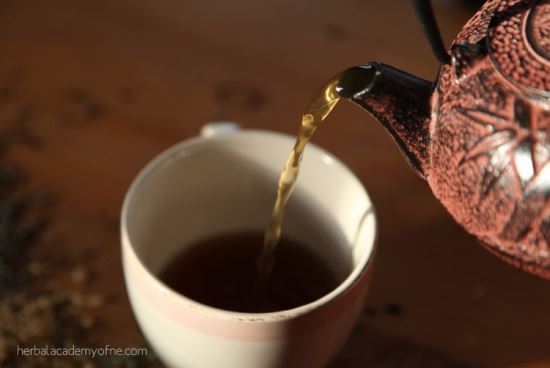
The cool, dry winds, unsettled weather, and decreasing daylight hours that we experience as the season transitions into autumn and winter can be difficult for our bodies and minds. While some of us welcome this rhythmic seasonal change and the downward movement of energy back to the earth and others dread it, we can all benefit by incorporating foods and herbs into our diet that help balance the energetics of the season. By doing so, we can replenish ourselves with the inward movement of energy as we settle into a slower, more deliberate season, enjoying warm soups and stews, bread fresh from the oven, a steaming cup of tea, and nights by the fireplace or curled up on the sofa.
Bodily imbalance may arise during autumn and the long winter months either due to illness arising from fluctuating weather or passing viruses around, reduced activity, the stress of the holidays, or the decreased daylight hours. We can turn to herbal teas to support our body’s resilience and to correct imbalance.
The process of blending and the ritual of making and drinking herbal tea is a fine way to tune into the slower rhythms of this season and is therapeutic in and of itself. Sipping a cup of tea allows us to pause for a moment and let the stillness of this time of year nourish us.
Read on for 4 herbal tea recipes that we can turn to this season to keep ourselves healthy and happy.
Tea Preparation
The recipes that follow use dried herbs. You may already grow herbs in your garden and dry them; if not, you can purchase bulk dried herbs at your local natural foods store or online, or if you are fortunate to have one, at a local herb shop. To make teas, you’ll just need a kettle (or pot) for boiling water, a pot for making herbal decoctions with rooty herbs, a measuring spoon, a teapot, a tea infuser or strainer, and a teacup (or two or three).
Take note, some of the recipe measurements are in parts. This “part” can be whatever you would like: 1 tablespoon, 1 cup, etc., depending on how big of a batch of dried herb blend you want to make. Just keep the ratio of the parts equivalent to the recipe!
There are two approaches to preparing tea: an infusion, which is used for more tender plant parts such as leaves and flowers (more on infusions here), or a decoction, which is used for harder plant parts such as roots and barks (more on decoctions here). Infusions involve boiling water, pouring it over the tea blend, and then steeping for 10-15 minutes.
Decoctions involve simmering the herbs with the water for 15-20 minutes to extract the plant constituents. In both cases, you’ll want to keep the tea covered during steeping/simmering, particularly for aromatic herbs with volatile constituents.
You can drink these teas as-is or choose to sweeten them with a bit of honey or maple syrup. Adding one or two dried apple rings to the tea while it steeps or simmers adds a subtle but lovely sweetness as well.
Teas for Autumn and Winter
The words that come to my mind when considering teas for autumn and winter are warmth, nourishment, immune support, and cold and flu relief. We can do much for our wellness just with the foods and herbs we choose as daily nourishment, and teas can be a part of this sustenance.
Herbal Nourishment Tonic
This tea is my go-to, vitamin- and mineral-rich tonic to nourish and support the body through the winter months.
Ingredients:
•2 parts nettle leaf
• 2 parts peppermint or spearmint leaf
•1 part lemon balm leaf
• 1 part milky oats
• 1 part red clover blossom
• 1 part burdock root
Directions:
Blend herbs together. Steep 1-2 tablespoons tea blend in each 1 cup of boiling water for 10-15 minutes. Sweeten to taste with honey, if desired. Several cups of this tonic tea can be consumed throughout the day. (A longer infusion period of several hours will extract even more vitamins and minerals; you can make a big batch, let it infuse overnight, and drink it throughout the next day, reheating if desired.
Warming Adaptogen Chai Tea
This warming tea keeps you toasty as the days turn cool while supporting the immune system and adrenals during the cold and flu season to help fend off illness.
Ingredients:
• 2 tablespoons reishi mushroom
• 1 tablespoon astragalus root
• 1 tablespoon eleuthero or ashwaganda root
•1 tablespoon burdock root
• 1 tablespoon cinnamon chips
• 2 teaspoons dried ginger (or 7 slices fresh ginger)
• 5 cardamon pods, crushed
• ½ tsp cloves
• 2 cups water
• 2 cups milk (dairy or non-dairy)
Directions:
1. Combine reishi, astragalus, eleuthero/ashwaganda, burdock, and water in a pot.
2. Bring to a gentle simmer for 15-20 minutes.
3. Add remaining herbs and milk, and heat for another 10-15 minutes.
4. Strain herbs and serve with honey or maple syrup to taste and a dash of nutmeg on top, if desired.
5. Refrigerate unused portion and reheat later. Drink up to 3-4 cups throughout the day.
Those who enjoy a more traditional chai recipe could add a tablespoon or two of loose leaf black tea (regular or decaffeinated) to this recipe along with the cinnamon, ginger, cardamom, and cloves. Check out the Herbal Academy blog for another take on herbal chai. Roasted chicory and dandelion root also add a rich, earthy taste.
Uplift Tea
As the dark nights grow longer and sun is in short supply, support your nervous system and mental outlook with these uplifting and building herbs.
Ingredients:
• 3 parts lemon balm leaves
• 2 parts St. John’s wort flower and leaf
• 2 parts milky oat tops
•2 parts spearmint leaves
• 1 part linden leaf & flower
Directions:
Blend herbs together. Steep 1-2 tablespoons tea blend in each 1 cup of boiling water for 10-15 minutes. Sweeten to taste with honey, if desired. Drink up to 3-4 cups throughout the day.
Nip It in the Bud Tea
At the first sign of a cold or flu, nip it in the bud with this immune- and lymph-stimulating tea! Make a big batch in the morning and sip it throughout the day to support your immune system during acute infection.
Ingredients:
•2 parts elderberries
•2 parts echinacea root and/or leaves
• 2 parts calendula petals
• 1 part rose hips
• 1 part orange peel
• ½ part ginger root (or 1 part fresh ginger root)
• ¼ part cinnamon chips
• 1 cup water
Directions:
Add elderberries and water to a pan. Bring to a simmer for 10-15 minutes. Turn off heat and add the rest of the herbs. Let steep for 10-15 minutes. Strain and drink up to 3-4 cups throughout the day.
And get well soon!
Photos copyright Jane Metzger, Annie Hall, and Herbal Academy.
Source: Mother Earth News
ShareSEP
2017



About the Author:
Alex & Ashley Poptodorov are owners of A+A Wellness in ATL, GA. They have over 30 years combined experience with 14 years of running their own fitness facility in Tampa & ATL. They relocated to ATL in 2013 and now offer Fitness, Nutrition, Lifestyle & Traditional Naturopathy programs including Online Coaching and their online Forum called the A+A Wellness 'Inner Circle'.